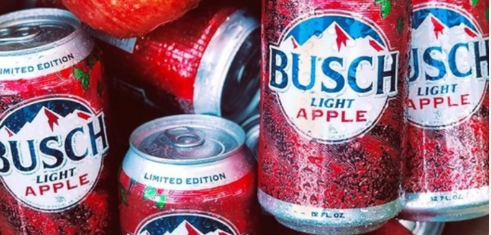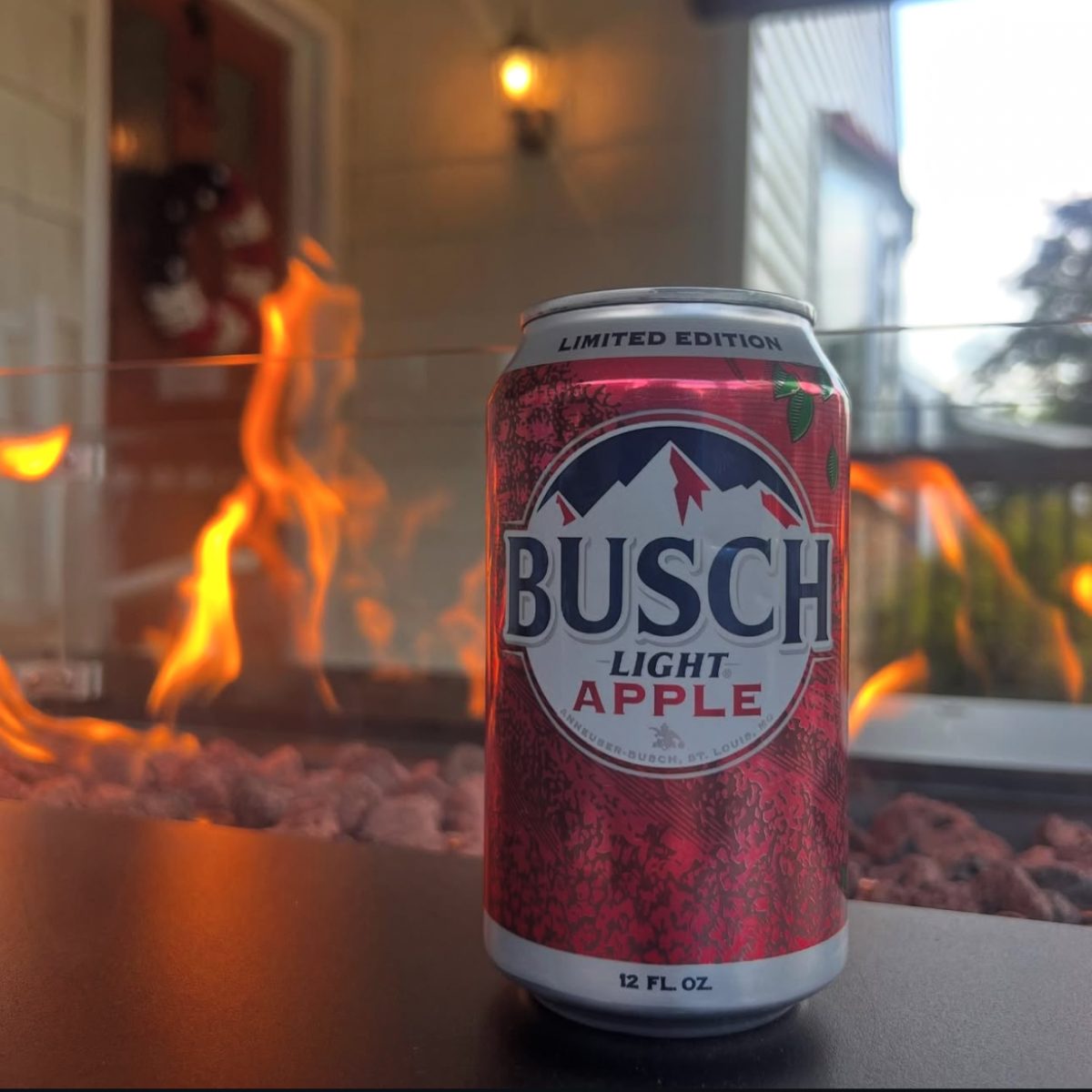Busch Apple, often nicknamed “Bapple”, was a surprise limited-time-only release in the summer of 2020 by Anheuser-Busch. Busch Beer is typically known for its rugged brand image, meaning the fruity beer was met with doubt. The skepticism surrounding Bapple contributed to the memorability of its initial release. Even as a limited-time flavor, Bapple sold over one million cases in less than nine weeks. Because of this widespread popularity, Busch rolled out the flavor nationally in 2022. Mania ensued for legal and underage drinkers alike. It was not uncommon for people to track down trucks full of Bapple to purchase their beer.
The Anheuser-Busch company promoted Bapple heavily in an attempt to sustain its popularity. They catered to a younger audience by using over-the-top advertising that parodied action films with loud sound effects and dramatic lighting. This method of advertising quickly gained traction, leading to memes and social media reviews of Bapple. This social media activity appealed to a younger audience. Bapple became a staple at tailgates, outdoor events and backyards across the country – fueling underage parties. What was meant to be a seasonal gimmick turned out to be a fan favorite.
However, in the fall of 2023, Bapple was officially discontinued by Anheuser-Busch. This prompted fans to post nostalgic tributes and tongue-in-cheek posts thanking Bapple for its service. Bapple had become a staple for alcohol consumers and it was puzzling and disappointing that it was discontinued.
This spring, Anheuser-Busch surprised Americans across the country by releasing Bapple after two years without it. Bapple has been met with the same level of popularity that it did after its first release. Bapple sold out in liquor stores almost immediately. People have taken to social media to post their appreciation for its return, often including pictures of large sums of Bapple they bought. While the posts are lighthearted, the sensationalization of products like Bapple has the ability to introduce alcohol to new consumers.
Not only was Bapple highly marketed, but it is also commended for its exceptional flavor. According to experts, the apple taste is a perfect compliment to the taste of the light beer.
An OHS junior agreed with this evaluation. They said, “[Bapple] has changed my drinking habits because it is so good and doesn’t taste like beer.”
Bapple In High Schools
The return of Bapple has reached Owatonna High School. Many students remember its initial release and that has influenced them to try it now that it is back.
However, there are discrepancies about whether students’ parents support their alcohol consumption. Some students have parents who do not care about their drinking habits now that they are older.
An anonymous OHS junior said, “I remember my parents buying it during its first release. I definitely wanted to try it now that I’m a bit older.” This motive for trying Bapple is not uncommon for high school students.
An anonymous OHS senior said, “My parents do know that I drink, but since I’m 18 they don’t necessarily care.” Of the people interviewed for this story, about half shared similar experiences when it comes to their parents while half claimed to hide their drinking from their parents.
claimed to hide their drinking from their parents.
Regardless of whether their parents support drinking, students of OHS share similar motives for drinking alcohol. Every interviewee said they drink socially at parties, out with friends, at campfires or any other social events.
An anonymous senior said, “When I’m going out with friends on a weekend, we definitely drink a bit. It just helps loosen me up and have fun.”
While many students claim to drink exclusively for the social benefit, drinking can often be used as a mechanism to deal with the complex emotions that come with being a teenager.
An anonymous junior said that they drink “to numb some feelings [they] can’t handle.” Alcohol consumption as a coping mechanism is a dangerous habit.
The recent issue of Bapple is just a small sample of a larger problem of alcohol abuse by high schoolers. Although alcohol consumption rates in high school have been decreasing since 2013, it is still a glaring issue in the halls of high schools across the nation. Binge drinking is an issue for youth drinkers and refers to consuming five alcoholic beverages for men or four for women in a two hour period. Approximately 91 percent of all alcohol consumed by youth is consumed by individuals who participate in binge drinking. Binge drinking often results in dangerous behaviors including drunk driving, violence, alcohol poisoning and unsafe sexual behaviors.
The return of Bapple has taken the United States by storm. Adults and teenagers alike have swarmed aisles of liquor stores to get their own. Effective advertising, alcohol culture in teenagers and the long awaited return of the beer have all played a significant role in the popularity of Bapple in high schoolers. High school students have different motives to drink, ranging from social reasons to a coping mechanism. Bapple has highlighted the overarching problem of binge drinking and excessive alcohol consumption in youth.



